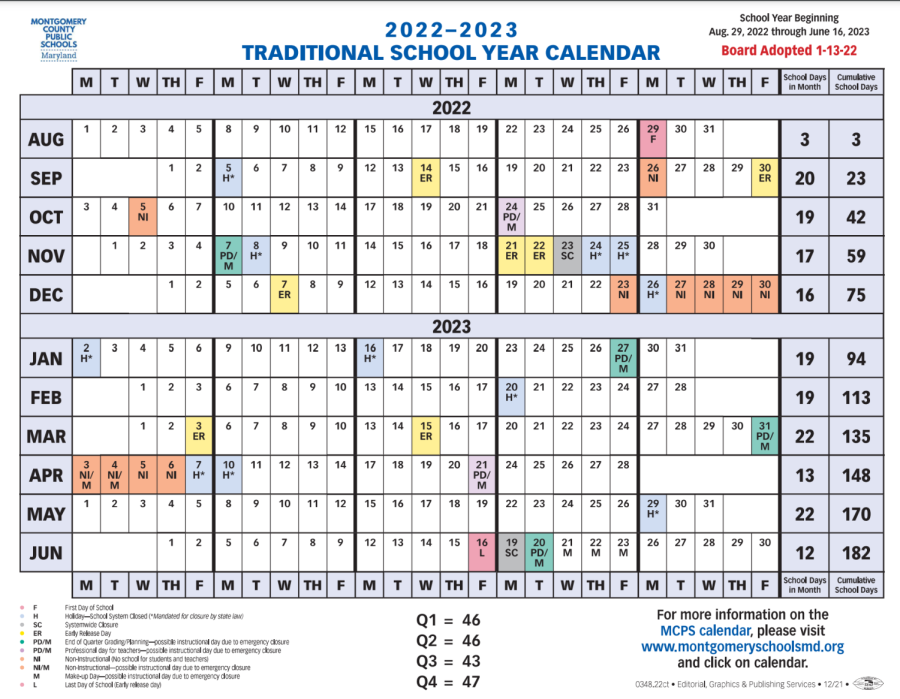Proposed MCPS calendar for 2023-2024 could shake things up
Photo courtesy of montgomeryschoolsmd.org
The school calendar for the 2022-23 school year was mostly normal, but could some shake-ups be coming just next year?
December 17, 2022
The first day of school is something that all students dread. But, could it be coming sooner than ever in the coming years? Possibly. Now that MCPS has recently released the proposed dates for the 2023-24 school year, it looks like the trend of earlier school openings is likely to continue. This combined with rumors of the Montgomery County Board of Education discussing the proposal of a more year-round school calendar has students and teachers alike asking questions.
According to MCPS, around 19,000 people across the country responded to a preliminary interest survey in mid-October to share their thoughts on different elements of the school year calendar. This led to MCPS creating a survey with four different options for the start of the school calendar. While this survey closed on Nov. 30, the results will be discussed during a special Board of Education Policy Management Committee meeting. The final recommendation for the 2023-24 school year and the superintendent’s recommendation will be discussed at a Board of Education meeting on Dec. 6, before being finally released later this year or early next year.
While some of the proposals are vastly different from the typical calendar that we are accustomed to, some of the proposals have extremely different characteristics, each with its own pros and cons.
Scenario A includes the earliest start date with the first day being mid-August, a longer winter break and the typical last day of school around the middle of June. Scenario B also features a mid-August start date, but notably includes a one-week-long thanksgiving break and an earlier than normal early June last day for students. Scenarios C and D are very similar to each other with a late August first day of school. The only difference between the two scenarios is that Scenario D includes a mini-break during the month of February. Both scenarios include a mid-June last day of school.
There seems to be no scenario that is favored by the mass majority of people, however, one thing is clear: students are against the earlier start date.
“I’m personally opposed to the start date being pushed up even earlier in August because I think that most students, especially those who work in the summer or go on vacation during August, would prefer to have school as late into August as possible,” WCHS senior Isaac Horn said.
Summer is an important time of growth for students outside of school. The free time allows students to pursue personal interests and hone new skills and hobbies. Along with this, opportunities at summer programs and camps help students develop social skills and enjoy new experiences.
Possibly the group mostly affected by this possible early start date is students who have summer jobs. The shortened summer could be detrimental to students who work jobs over the summer as it gives little time between their work schedule and the start of the school year.
“I think this change would put more pressure on students to mentally prepare for school earlier. As someone who worked last summer until late August, I found that I was more unprepared for the adjustment period at the beginning of the school year than in previous summers,” Horn said. The prospect of returning back to school can be daunting to many students as the school year comes with more responsibilities and greater stress.
However there is a possibility that there is an even greater change in the future. There have been rumors of the discussion of the implementation of a year round school calendar. While to many this sounds outrageous, it is surprisingly common. According to the National Center for State Education Reform, 14 states have year round schools. This consists of around 200 standard school days with three-four week breaks distributed throughout the year instead of the typical three month summer vacation.
This idea actually does have its merits. According to the American College of Education, year round schooling provides a more structured environment for students, helps close the achievement gap between low and high income students and would lead to teachers receiving a year round salary. While all this is true, its downfalls are massive as the summer is a time for students and teachers to rejuvenate after a long nine months of school, along with this year round schooling would raise operating costs. This leads to the idea being extremely unpopular among teachers and students.
While we are unsure what changes are coming in the future one thing is certain, the school calendars for 2023 and beyond may be very different then what students and teachers are accustomed to. Students, parents and teachers should be on the lookout for the 2023-24 school calendar in the coming weeks and when they see changes, they should not be shocked.



